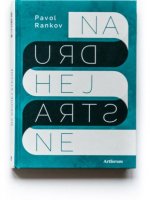
The current combination of annulling entrance visas and strengthening emigration controls has taken on a symbolic significance. They can be seen as a metaphor for emerging class divisions.
(ZIGMUNT BAUMAN – Globalization)
Their cohabitation began when Blanka moved into Pietro’s flat in Turin. Not Blanka’s cohabitation with Pietro, but Blanka’s with Antonietta. With Pietro Blanka really only cohabited after dark. He would come back from his firm about seven and they had supper together—Blanka mostly fed him salads, because they can’t be overcooked or burnt—then, in accordance with Pietro’s bachelor habit, they would get into bed to watch some totalmente stupido television programme such as only one of Berlusconi’s television companies is capable of putting on; for example news about the lives of celebrities where, in the role of requisites, peroxide veline in bikinis hang from ropes. The presenter taps them on the head with his finger from time to time and pronounces them to be completely empty. People in the studio find this enormously entertaining, Pietro too. Blanka didn’t even know how she would translate the word velina into Slovak.
In the morning Pietro would get up while Blanka was still asleep and prepare breakfast for her; that is, he took yogurt and juice out of the fridge, and woke her with a goodbye kiss. He hurried because he always wanted to be first in the agenzia; he wanted to know what his subordinates were doing.
At the beginning Blanka asked him to wake her as soon as he got up, but Pietro didn’t want to. He laughed, saying that when he was Blanka’s age, he could also sleep until lunchtime and hated anyone who prevented him from doing so. And as he didn’t want Blanka to hate him, he would let her sleep.
Antonietta used to arrive about ten. In the first few days she used to catch Blanka still in her pyjamas. Blanka felt very embarrassed when Antonietta moved round her with a mop or vacuum cleaner and when she sent the dust whirling around her head with that strange, senseless implement that looked as if it was made of peacock feathers. Blanka felt like a parasite, an exploiter oppressing a poor proletarian woman dependant on the couple of hundred euros Pietro paid her for cleaning the flat.
I don’t want us to have a servant, Blanka told Pietro immediately after her first meeting with Antonietta. Pietro looked at Blanka in surprise, as if he had failed just once more to understand her broken Italian. Then he began to explain the difference between the words serva, that is, servant, and domestica, housekeeper. Servants are found in palaces and chateaux, while every rationally thinking member of the upper middle class had a housekeeper.
Tranlated by Heather Trebatická